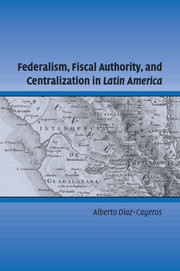Book contents
- Frontmatter
- Contents
- List of Figures
- List of Tables
- Preface
- Federalism, Fiscal Authority, and Centralization in Latin America
- 1 FEDERALISM, PARTY HEGEMONY, AND THE CENTRALIZATION OF FISCAL AUTHORITY
- Part I Fiscal Centralization in Mexico
- 2 REGIONAL FRAGMENTATION AND FAILED COMMITMENT
- 3 THE OFFICIAL PARTY AS A REGIONAL COMPROMISE
- 4 NOMINATIONS, VETO PLAYERS, AND GUBERNATORIAL STABILITY
- 5 TRANSFERS AND REDISTRIBUTION IN THE MEXICAN STATES
- Part II Centralization and Revenue-Sharing in the Latin American Federations
- References
- Index
- Titles in the Series
5 - TRANSFERS AND REDISTRIBUTION IN THE MEXICAN STATES
Published online by Cambridge University Press: 08 January 2010
- Frontmatter
- Contents
- List of Figures
- List of Tables
- Preface
- Federalism, Fiscal Authority, and Centralization in Latin America
- 1 FEDERALISM, PARTY HEGEMONY, AND THE CENTRALIZATION OF FISCAL AUTHORITY
- Part I Fiscal Centralization in Mexico
- 2 REGIONAL FRAGMENTATION AND FAILED COMMITMENT
- 3 THE OFFICIAL PARTY AS A REGIONAL COMPROMISE
- 4 NOMINATIONS, VETO PLAYERS, AND GUBERNATORIAL STABILITY
- 5 TRANSFERS AND REDISTRIBUTION IN THE MEXICAN STATES
- Part II Centralization and Revenue-Sharing in the Latin American Federations
- References
- Index
- Titles in the Series
Summary
The Consequences of Centralization
The political equilibrium generated through nominations within the hegemonic party became reflected in the willingness of Mexican regional politicians to accept a centralized fiscal bargain during the second half of the 20th century. The comprehensive revenue-sharing system that exists today originated from a political equilibrium in which politicians at the local level retained their local aspirations but were willing to cooperate with politicians at the national level. In this sense, the integration of a nationalized party system in Mexico predated fiscal centralization. It is often assumed that the revenue-sharing system was always meant to be a redistributive arrangement. Because Mexico's regime claimed as part of its revolutionary credentials a quest for redistribution, scholars often assume that revenue-sharing formulas would have been devised with redistribution in mind. This chapter suggests instead that to a large extent transfers in the Mexican federation have tended to be regressive rather than redistributive.
Two parallel developments converged to create the system that characterizes intergovernmental fiscal relations in Mexico today. The first was the establishment of revenue-sharing between states and the federal government at the beginning of the 1940s, which gave states unconditional transfers (participaciones) out of the collection of revenue from the exclusively federal excise taxes. This initial revenue-sharing system established state shares on a case-by-case basis for each specific tax. The second development was the creation of a federal sales tax in 1947 (the Impuesto Sobre Ingresos Mercantiles – ISIM).
- Type
- Chapter
- Information
- Publisher: Cambridge University PressPrint publication year: 2006

